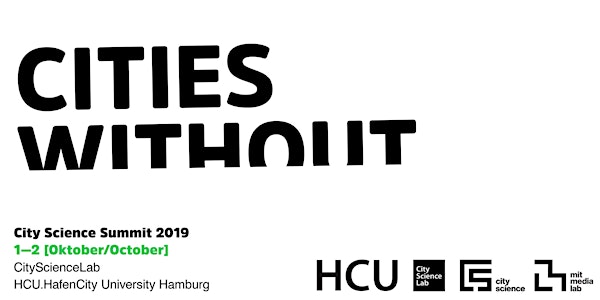
City Science Summit 2019
Date and time
Location
HafenCity University Hamburg
CityScienceLab Überseeallee 16 20457 Hamburg GermanyDescription
Cities Without...
City Science Summit 2019 at City Science Lab, HafenCity Universität Hamburg, in a cooperation with the MIT Media Lab
The CityScienceLab at the HafenCity University Hamburg (HCU) hosts the 2019 City Science Summit. The two day international conference will look towards future cities that are more livable and innovative in using digital novel technologies for urban decision-making, design, and operation. In addition to members of the City Science Network, we will welcome established experts, high level CEOs and international academics for conversations, talks and workshops.
The Summit is taking place on October 1st and 2nd presenting two days of high profile keynotes, input presentations, sessions and interactive workshops that will focus on the current questions and future development of urban spaces and international metropolis. The title „Cities without ...“ refers to a positive future, envisioning, for example, mobility without cars, governance without bureaucracy, economies without currency, learning without schools and access without ownership.
The opening keynotes will take place at the Elbphilharmonie Hamburg where Lord Norman Foster (Architect) will discuss the Power of WITHOUT and how these ideas could improve the lives of people living in informal settlements without access to conventional infrastructure. Following their keynotes, they will join a conversation with Gesa Ziemer (City Science Lab Hamburg) and Kent Larson (MIT, City Science Group).
In the second part of the first day we will present a series of focused presentations, which will outline other major mathematical aspects of the Summit. Invited speakers are, for example, Maja Göpel (WBGU, UNESCO) Joelle Pianzolla (ETH Zürich/to be confirmed) and Michael Uwemedimo (Collaborative Media Advocacy Platform).
The conference continues on October 2nd with more than 25 workshops and sessions at the HafenCity University Hamburg, focusing on mobility, logistics, informal urban planing, participation tools and digital communication, Building Information Modeling, data visualization, Digital Twins, Agent Based Moddeling, ICT tools and current migration movements as well as the SDGs, the UN goals for a sustainable development.
The City Science Summit at Hamburg is an international Network meeting, not only for the City Science Network, including our partners from Boston, Quito, Buenos Aires, Barcelona, Andorra, Helsinki, Cairo, Dubai, Taipei, Shanghai and Beijing, but also for international academia, stakeholders and companies. Adding to that an additional track, centered around Researching the Digital City, will focus on young researchers.
The CityScienceLab at the HafenCity Universit HCU
The CityScienceLab investigates urban challenges in the era of digitalization in cooperation with partners from civil society, politics, academics, economy, and science. We pursue an inter- and transdisciplinary perspective by using novel technologies for urban decision making, design, and operation and by linking technical issues with social and cultural developments. To contribute to making future cities more livable and efficient, we develop digital city models on the basis of comprehensive urban data to help visualize and simulate complex urban development processes.
https://www.hcu-hamburg.de/en/research/citysciencelab/
The City Science Group at the MIT Media Lab
The MIT Media Lab is an an interdisciplinary research laboratory at the Massachusetts Institute of Technology, growing out of MIT's Architecture Machine Group in the School of Architecture. Its research does not restrict to fixed academic disciplines, but draws from technology, media, science, art and design. The City Science research group proposes that new strategies must be found for creating the places where people live and work, and the mobility systems that connect them, in order to meet the profound challenges of the future.
https://www.media.mit.edu/events/hamburgcitieswithout/
You can find more information about the City Science summit at:
http://citysciencesummit.org/
https://www.facebook.com/events/434681857319653/
https://twitter.com/citysciencelab
Sponsors and Partners
Deutsche Forschungsgemeinschaft
ahoi.digital Allianz Hamburger Hochschulen für Informatik
Agenda - October 1 - Elbphilharmonie (invitation only)
Platz der Deutschen Einheit, Hamburg, Germany
12:00 - 14:00 The Power of Without
Lord Norman Foster
Followed by conversation with:
Gesa Ziemer and Kent Larson
14:00 to 15:30 – Lightning Talks
5 minute lightning talks presented by the City Science Network
Agenda - October 2 - HafenCity Universitat
Uberseeallee 16, Hamburg, Germany
07:30 – Urban workout
09:30 – Welcome and Registration
10:00 – Introduction
10:30 to 12:00 – Workshops presented in parallel
12:00 – Coffee break
12:15 to 13:30 – Workshops presented in parallel
13:30 – Lunch and Networking
15 to 16:30 – Workshops presented in Parallel
17:00 – Joint Session wrap up, presentation of workshop documentation
18:30 – Get together drinks
19:30 – Event Close
Workshops to include:
Mobility WITHOUT Cars
Development WITHOUT Formality
Learning WITHOUT Schools
Decision Making WITHOUT Governance
Cities WITHOUT Art
Organized by
To contribute to making future cities more livable and efficient, the CityScienceLab develops digital city models– so-called CityScopes – on the basis of comprehensive urban data. CityScopes help visualize and simulate complex urban development processes (more details research and teaching).
The city-state of Hamburg is the ‘living lab’ in which urban transformations are being investigated and new solutions are developed all the way up to the level of urban applications. As well the CityScienceLab has a close cooperation with the City Science Group of the MIT Media Lab(Cambridge/USA). Furthermore the research network of the CityScienceLab includes different partner from civil society, academic and private sector (more details cooperations).
MIT Media Lab is investigating how new models for urban architecture and personal vehicles can be more responsive to the unique needs and values of individuals through the application of disentangled systems and smart customization. We are developing technology to understand and respond to human activity, environmental conditions, and market dynamics. We are interested in finding optimal combinations of automated systems, just-in-time information for personal control, and interfaces to persuade people to adopt sustainable behaviors.